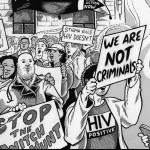I tested positive for HIV in 1992, but it took me several years to connect with others living with the virus. I spent those years mentally preparing to die by age 30. In the thick fog of my depression, finding community seemed pointless to me.
That all changed after effective treatment for HIV arrived in 1996. I was among countless others who had found new purpose in life. I went to graduate school for a master’s degree in publishing management. I took a few chances on publishing start-ups. I even had my first few truly long-term relationships. I dared to dream of what could be.
Feeling better about my prospects finally led me to find connection with others living with HIV. I understand the privilege of that pathway to community. For so many of my fellow long-term survivors, finding such connection was essentially mandatory. Their hopes for survival depended on it.
Case in point: HIV activist and artist Ivy Kwan Arce, this issue’s cover subject. In 1992, she saw a poster on the New York City subway that read, “Women don’t get AIDS—they just die from it.” Since Ivy had some cause for concern, she decided to get a test for HIV, which came back positive.
As a first-generation Chinese-American woman living with HIV, Ivy struggled to find others like her. It wasn’t until she was introduced to the People With AIDS Health Group that she finally felt seen. The group’s director entrusted her with the creation and development of graphics and artwork. The rest is history. Go here to read more about her amazing journey.
Ivy’s story is a wonderful example of the contributions of women to the HIV movement. In this special issue dedicated to women and youth, we explore additional examples, such as Iya Dammons, the executive director of Baltimore Safe Haven.
The group provides resources to LGBTQ people at risk for homelessness, substance use and sex work. It provides housing to clients ranging from young adults to seniors. The organization also offers HIV testing and other prevention services. Go here to read more about the group and Iya’s journey as a Black transgender woman.
Helping youth is one of Iya’s goals. The same is true for Mackenzie Copley and David Schaffer, MD, cofounders of One Tent Health, a youth-driven and youth-led nonprofit in Washington, DC, that provides HIV screening in the most underserved and lowest-income neighborhoods. Go here to read our Q&A with Mackenzie and David by HIV activist and former youth leader Matthew Rose.
An increasing concern for women living with the virus is HIV criminalization laws. Though the public face of these laws has been gay men—particularly gay Black men—recent data show that such legislation also targets Black women. Go here to learn more.
When it comes to overcoming the obstacles that HIV can put up, a great example is Kia LaBeija. Born with HIV in 1990, Kia lost her mom to the virus in 2004. She recounts her experiences in a new art exhibit, her first solo museum show. Go here for details.







Comments
Comments